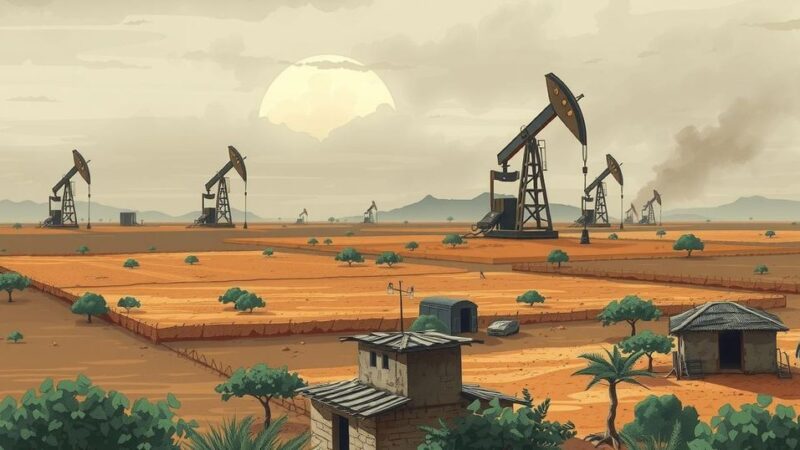Walid Jumblatt, a pivotal figure in Lebanese politics, discusses Israel’s destabilizing plans in the Arab world and advocates for support of Lebanon’s reconstruction efforts under new leadership. He emphasizes the persistent threats to Lebanese sovereignty and the need for systemic change in the region, while spotlighting the potential of Syria’s new government under Ahmad Al Sharaa. Jumblatt’s perspectives reflect a commitment to understanding the delicate political balance and the importance of foreign aid amid crises.
Walid Jumblatt, a prominent Lebanese politician and Druze community leader, has remained an influential figure in Middle Eastern politics despite stepping back from his role as head of the Progressive Socialist Party in 2023. He articulated concerns about Israel’s strategic maneuvers, expressing that Arab nations must recognize Israel’s intention to destabilize the Arab world. In an interview with The National, he stated, “Israel has a free hand. It’s up to the Arabs to understand the dangerous policy of Israel that is planning to dislocate the whole of the Arab world.” His insights are particularly relevant as regional tensions escalate amid world-changing events, including the upheaval in Syria and the strained US-Iran relations.
Jumblatt’s political career has been shaped by decades of conflict, most notably the Lebanese civil war. Lebanon currently faces significant challenges, including ongoing military actions by Israel, which continues to conduct airstrikes in Lebanon despite a ceasefire agreed upon in November. Jumblatt emphasized that this ceasefire exists only in name, as Israel maintains military positions in Lebanon and continues bombing campaigns, undermining any notions of peace. He described the situation as a “big lie,” expressing skepticism about international pressures on Israel to cease aggression toward Lebanon and other territories.
Despite the obstacles, Jumblatt acknowledged the Lebanese Army’s efforts to maintain stability and urged for international support to rebuild devastated southern Lebanon post-conflict. He lamented the lack of financial resources within Lebanon to address the immense infrastructural damage caused by Israeli military actions during the ongoing conflict, with a World Bank estimate placing the cost at $14 billion. He stressed the necessity for foreign assistance, reinforcing the importance of reconstruction efforts in war-torn areas of Lebanon.
On the topic of Hezbollah, Jumblatt recognized the group’s complex role within Lebanese society. He noted that the armed group, while facing severe military and political pressures, continues to function as a political entity. He remarked that engaging in armed resistance would not be effective, stating, “Hezbollah should understand that now, going back to the old methods … armed resistance – it won’t work.” His acknowledgment of Hezbollah’s role reflects a nuanced understanding of the turbulent political landscape in Lebanon.
Furthermore, Jumblatt offered a unique perspective regarding Syria’s new leader, Ahmad Al Sharaa, advocating for a chance at governance following the regime change that saw the fall of Bashar al-Assad. He expressed hope that a united Syria under Al Sharaa could provide stability and represent the Syrian people’s interests, despite the historical context of tension between his own family and the Assad regime. The newly established government in Syria, according to Jumblatt, should be given an opportunity to foster unity among its population.
Jumblatt cautioned about Israel’s ongoing efforts to divide Syria and noted the danger of Israeli military actions targeting various regions, including Syria’s Druze community. He dismissed any perspectives that suggested normalization of relations with Israel, reaffirming Lebanon’s firm stance against recognition of the Israeli state. He emphasized, “I’m not favouring and will never favour peace between us and Israel,” alluding to Lebanon’s complex geopolitical stance vis-à-vis Israel and the ongoing conflict in Gaza.
As the region faces rapid changes, particularly following the October 7 attacks by Hamas, Jumblatt remains steadfast in his commitment to Lebanese sovereignty and the plight of Palestinians. He condemned the extensive loss of life in Gaza as part of a broader, calculated plan involving geopolitical powers, contributing to an atmosphere of despair and destruction within the Palestinian territories. In conclusion, Jumblatt’s reflections underscore the interconnectedness of regional politics, national identity, and the pressing need for dialogue amidst turmoil.
In summary, Walid Jumblatt’s insights reveal the intricacies of Middle Eastern politics, addressing Israel’s aggressive strategies, the challenges facing Lebanon, and the potential for change in Syria under new leadership. His emphasis on the significance of supporting the Lebanese Army, reconstructing war-torn areas, and acknowledging the political entity of Hezbollah reflects a sophisticated understanding of regional dynamics. Jumblatt’s call for international assistance and a nuanced approach toward Israel indicates the complexity of peace efforts within a historically tumultuous landscape.
Original Source: www.thenationalnews.com






